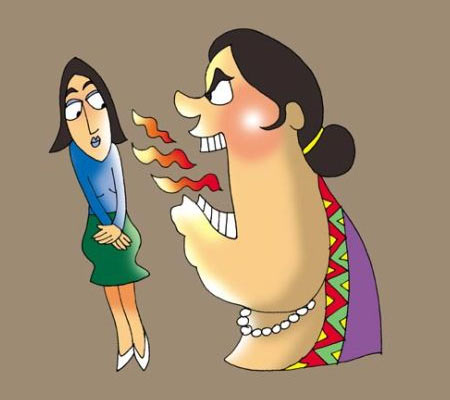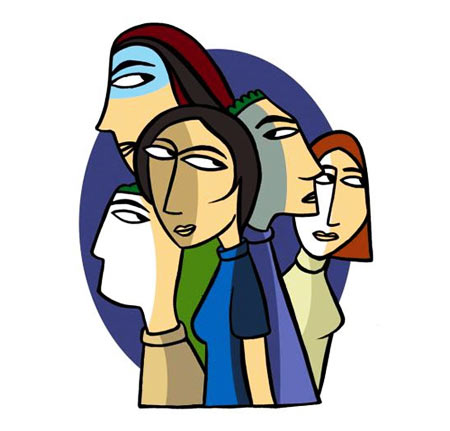From parental pressures to lack of values and absence of heroes to look up to; students, teachers, psychologist and career counsellors tell us just what issues dog Indian youth today.
Prayag Arora sounds groggy on the phone. He hasn't had a good night's sleep for a while now. During the weekend he was working on the Twitter feed for his client and managed to double their followers on the microblogging site. On Facebook, he's involved in getting them more 'likes' for each of their updates; more the 'likes' more he will get paid.
It isn't however about the money for Arora. He comes from a fairly affluent family in Mumbai and could have chosen to take it easy this summer before he began the next year in college.
Yet Arora, almost 19, is restless. Last summer he was interning at a newspaper office in the city. This year he is interning at a social media company. And he's already sure of what he wants to do by the time his college reopens for the academic year in June -- he has a few ideas which he's already run by his current bosses which he hopes to execute in the next few months.
Although she isn't from the same city as Arora, Shruti Sharma, also 19, is 'preparing for life'. With six weeks staring at her, Sharma who hails from Nagpur, has enrolled herself in a local grooming class, is learning German and when I last spoke to her, was looking for an internship so 'I don't waste my time'.
Arora and Sharma share the restlessness of a generation that seems to be eager to get ahead in life. Even though neither knows exactly what s/he wants to do, both have a vague idea of where they see themselves in the next five years.
While Arora is toying with the idea of 'doing something' in the media industry, Sharma hopes to get into the civil services -- 'probably IFS'.
What brings these two seemingly diverse souls under one umbrella is their impatience, an earnest desire to ensure they get some sort of a head start in life.
"It's hard to find work. And it's ping off to see how even in today's times, you need contacts to get a job. If I have four internships on my resume when I apply for my first job, my boss is bound to look at me differently," Arora tells me, sounding like a man who could with a little more sleep, "There's just way too much competition and if you're not ready, you probably will be left behind."
The pressure to 'make it' in life in the face of immense pressures is one of the greatest challenges that young Indians are faced with today, feels psychologist Saida Raval.
While some like Arora and Sharma are fairly clear about what they want to do in life, Raval says that the various career options available for young people today tends to leave them a little, well, lost.
"They often find themselves torn between doing what they want and what will help them make money," she says.
Illustrations: Uttam Ghosh
Issues young Indians face today
Things get complicated when parents decide to add their two bits worth. A friend and mother-of-two likes to (somewhat incorrectly) call this 'the 3 Idiots syndrome'. "It's a typically middle class thing to do -- push your kids into B-schools and expect them to earn eight-figure salaries at the end of their education."
Sadia Raval agrees. Parental pressures aren't easy to fight off she says and these very pressures drive young children up against the wall. "Very often, taking up a stream (of education) you don't like results in a great deal of confusion and disillusionment. There are cases when kids manage to get into IITs but sooner rather than later realise their hearts are not into it; they fare poorly in their tests; disillusionment sets in and that leads to demotivation and loss of self esteem. It's a vicious circle."
These kinds of parental pressures, Raval says, exist at all levels often starting when the child is still in school.
When I asked Parul Sharma how early these pressures really start, she chuckles, "Pretty early on in life."
Sharma's book Bringing up Vasu: That First Year, offers a tongue-in-cheek view of a first-time mother's attempts to give her son 'everything that is best for him'. And while the situations described in it seem almost farcical in nature, the protagonist's attempts to get her son into the best pre-school or make available the best that is there for him in the market does touch a chord.
"There is a certain type of parent that tries to push on its child his/her ambitions and there are others like Mira (her protagonist) whose intentions are well-placed and driven with the sole purpose of getting the best for her child. Does that justify the pressures on the kids? I don't think so," she says.
Raval continues, "Parents often push their children into tuitions and extra classes in the hope that they turn out to be superstars."
The results however are far from desirable.
"There is so much on their plate that many students simply cannot cope with it. I have seen fairly bright students breaking down and giving up," Raval says adding that the number of children breaking down just before Class 10 and 12 exams has gone up drastically in the last few years."
Issues young Indians face today
If on the one hand parental pressures aren't bad enough, peer pressures make matters only worse.
"It matters to young people how many friends they have on Facebook or what brand of clothes they wear, what mobile phone they use and who they're seen with. The funny part is that they may be ok with what they have as long as they don't know what their friends do too," Sadia Raval tells me.
A friend and a mother-of-two once told me that her daughter was angry for purchasing a Maruti Swift because it was too downmarket for her. Her daughter is said to have told her that she 'should've considered a Honda CRV'. My friend, a single mother in her early 50s and had the liberty of having a car quite late in life herself, gasped at the thought and quite simply asked her to take the bus since she found being seen in a Swift below her dignity!
Doctoral candidate Antoinette Landor who presented some of her findings at the World Congress for Sexual Health in Glasgow has drawn a connection between teens losing their virginity and peer pressure.
Landor explains that peer pressure often drives young people into their lovers' beds. "They are more likely to have a higher number of sex partners and a higher number of oral sex partners. They are more likely to not delay sex, and engage in sex without any contraception," she says.
Although Landor's study does not include Indian teens, the findings are relevant to the (urban) Indian context too. A former colleague who studied in one of the more posh schools in Mumbai with more than a dozen Bollywood kids as his classmates told me that they 'went the whole hog' by the time they graduated out of Class Ten. He laughed heartily as I looked at him with some amount of disbelief (and perhaps a little jealousy) and assured me he wasn't lying.
What he said was confirmed by India Today's most recent sex survey that revealed at least 24 per cent respondents across the country had lost their virginity while they were still in their teens (the figures were 20 per cent higher in Delhi).
"It is almost like a competition," my Maruti Swift-driving friend tells me. "If your friend has slept with someone, you want to as well, just to prove a point and just so you can fit in with the group."
Issues young Indians face today
Fitting in often comes at a price. If you have a Nokia, you want a BlackBerry; if you have a BlackBerry, you want an iPhone.
Surely a young adult has more demands than his/her parents can handle but living in an increasingly globalised world where everything is accessible at the click of a mouse and swipe of a card, many are lamenting the rising materialism amongst young Indians.
Sadia Raval points out that folks of my generation and half a generation before mine -- children of the '80s and '70s -- even give in to their children's demands in part because we never had those opportunities. The other reason, she adds, is guilt.
She says, "Most of us are working parents getting to spend little or no time with our children. Buying things they ask for is seen as a way to compensate our absence in their lives. What we don't realise is that because we didn't have certain things, we have certain values. So in a way it is the parents who are to be blamed for compensating their absence with gadgets and games and filling their lives with things they don't need. We don't seem to be telling our kids that struggle is part of life."
Issues young Indians face today
The rising materialism amongst young Indians is effectively resulting in lack of idealism, according to some. "Yours isn't a very giving generation," Dr Kiran Bedi said in an interview recently.
"Most youngsters I've come across are better skilled and informed than their previous generations, healthier and aware of things around them. Their expectations are high and many of them persevere to do well," she said, "This is a generation that is confident and has set goals for themselves that they are impatient to achieve."
"But you must know that processes and means are as important as the end. Patience is the key and you must understand that it is vital to give back and being responsible is important. Responsibility is as important as growth. You cannot just exercise your rights and get away without performing your responsibilities. Understand that it should not be about 'me' but rather 'us'."
In a separate interview to a colleague, actress Nandita Das too lamented about fading idealism.
"I have widely seen that there is fading of idealism.... In my times idealism was seen as a good thing but today it's seen as a foolish thing (sic) to be," she told him suggesting that perhaps a part of this fading away of idealism and rising materialism probably had to do with the economic liberalisation programme of 1991 which opened the Indian markets to products and services that were till then never even heard of.
Read Nandita Das' interview here!
Preeti Shirodkar, a professor at a Mumbai college is more acerbic about her assessment. She suggests that somehow young Indians don't seem to understand or appreciate the value of ethics and tend to use people around them only as means to get somewhere else.
"Most of you assume that whatever you've got is rightfully yours and yours alone and completely disregard the human effort that goes into the making things available for you."
This in turn, she points out leads to a great deal of distraction, the only other evil according to her in this generation of Indians. Lack of values and distraction are pretty much the source of all problems according to her; everything else is just an offshoot of these two issues. "Because there is so much around you, you are unable to focus on what is really important. You don't read, you don't learn and you are unable to assimilate things around you," she points out adding that the educated-unemployable are but a result of these two issues.
Issues young Indians face today
Amit Bansal is a career counsellor and trainer who heads PurpleLeap, an organisation that works with colleges to make students employment-ready. One of the greatest challenges he hopes young today overcome is the unusually high expectations they have from their workplace.
"Many engineers and management graduates have little or no understanding of what kind of work they would be doing in their first job. Everyone wants it to be glamorous; it isn't. Engineers are disappointed because they have to work on other people's code and don't get to write one of their own till almost two to three years in their careers. Fresh off the boat management trainees want to work on pricing, branding, marketing -- things that you can get to only after some amount of experience in the field."
Bansal recollects his first job where during a one-on-one interaction with Bharat Puri the then top boss of Asian Paints asked him what he saw himself doing in the company. Enthusiastically he told him how frustrated he was and exactly what he wanted to do. After letting him finish, Puri simply told him, "This is what I do after years of experience. If you do all of this, what job will I get to do?"
Patience really is the key, Bansal points out, and one that young Indians seem to have lost somewhere along the evolution path in part perhaps because of lack of mentors and mentorship programmes as part of HR activities in corporate houses.
Issues young Indians face today
Though we may not necessarily look at it that way, the lack of a strong role model is the greatest issue facing young Indians today.
At a recent book launch, software icon N R Narayana Murthy pointed out that 'the number of role models our youngsters can look up to is decreasing'.
The corrupt, he said, are slowly but surely becoming the only role models for young Indians.
'Our youngsters don't have role models to look up to and therefore and sadly because of corruption, some of the people who are doing exactly the opposite, dishonest, deceit, 'chalta hai' and all of that... they are becoming more and more powerful, they are becoming wealthier. Therefore, our youngsters are getting the wrong signals. They think maybe this is the way to succeed. I don't blame them,' he said.
Saida Raval agrees, "There is little that children have around them to be inspired by. I can't see a lot of people having role models. I don't come across kids who say they want to be like person x. That also makes them a little more lost. Parents are always trying to get their kids disciplined but rarely do they see what comes out of this discipline, what is the result, who they can be! There is no such towering figure in that sense for this generation that can drive them towards single-mindedly achieving something."
Raval's point does strike a chord with me. Surely there is Anna Hazare you may say but, I am a little sceptical of calling him the icon of my generation, not so much because of who he is but because of who we are.
In fact, when you think about it, you don't see too many towering figures in fiction too. For what they were worth, our parents and their parents had their set of heroes. Be it Jay Gatsby or Atticus Finch or even Feluda or Devdas. In films too, you had Anand, 'Mother India' and Bhootnath.
It isn't a surprise then that many of our filmmakers are steadily turning to classics, attempting to remake them and reinterpret them for our generation.
Of these, the one film that stands out is Anurag Kashyap's Devdas. The intelligent interpretation of the story and indeed the characters sees Kashyap's Devdas giving up his Paro and choosing to go back to Chandramukhi.
Unlike Sharat Chandra Chattopadhyay's protagonist who burns the candle from both ends going out all guns blazing, Kashyap's modern Devdas returns to his little room, back to his little life and a conventionally happy ending.
That in more ways, speaks to me not just about our heroes but also about our generation -- that loves to arrive with a bang but almost invariably goes out with a whimper.







Comment
article